#can hiv be transmitted through urine
Text
youtube
How can I reduce my risk of getting HIV? #HIV #healthtips #raphacure - YouTube
🌈⚡️ Empower Yourself: Reducing Your Risk of HIV Infection! #HIVAwareness Curious about ways to minimize your risk of HIV? Empower yourself with essential knowledge and take proactive steps to protect your health. Your well-being matters, and being informed can make a significant impact. 🌈⚡️ 🧡 Practice Safe Sex: Consistently and correctly use condoms or dental dams during sexual activity, especially with new or unknown partners. This greatly reduces the risk of HIV transmission. 🚫 Avoid Sharing Needles: If you use injectable drugs, never share needles, syringes, or any equipment. Use clean, sterile supplies to reduce the risk of HIV and other infections. 💉 Consider PrEP: Pre-exposure prophylaxis (PrEP) is a medication taken daily by individuals at high risk of HIV. Consult a healthcare provider to determine if PrEP is right for you.
💪 Maintain Good Health: A healthy immune system can help protect you. Eat a balanced diet, exercise regularly, manage stress, and get sufficient sleep. 🌡️ Regular Testing: Get tested for HIV regularly, especially if you engage in high-risk behaviors. Early detection allows for prompt treatment and reduces the risk of transmission. 👥 Know Your Partner's Status: Communicate openly with your sexual partners about their HIV status and get tested together. This helps build trust and make informed decisions. 🌈 Supportive Relationships: Cultivate a network of friends and partners who prioritize safe practices and open communication about sexual health. 💬 Educate Yourself: Stay informed about HIV transmission, prevention methods, and the latest advancements in HIV awareness and care. 🙌 Community Resources: Utilize available resources, such as local health centers, NGOs, and online platforms, to access information, testing, and support. 🌆 Stay Informed: Stay connected with HIV-awareness campaigns, community initiatives, and reliable health sources to stay up-to-date on prevention strategies. Before watching the video, don't forget to SUBSCRIBE to our channel to receive many more tips and updates! For professional help and access to essential tools, download our mobile app: 📲 Android: [Link: http://bit.ly/3JACQOb] 🍏 Apple: [Link: https://apple.co/3I0QKbe] Explore more at https://www.raphacure.com/Virtual-Con... or write to [email protected]. Remember, reducing your risk of HIV involves a combination of education, responsible choices, and proactive measures. Every step you take towards HIV prevention contributes to your overall well-being. 🗣️ Spread the Awareness, Promote Health! 🗣️ Share this valuable information with your circle to raise awareness about HIV prevention. Knowledge empowers you to protect yourself and support others in their health journey. Prioritize your health, prioritize informed choices. Stay connected for more health insights and awareness. #HIVAwareness#StayProtected#PreventHIVInfection#HealthEmpowerment#StayInformed#wellbeingmatters how can i protect my partner from getting hiv?,getting tested,does pulling out reduce hiv risk?,can i get hiv if my partner is on treatment,hiv testing,how can i protect my partners?,risk,how can hiv be transmitted through kissing,how can you get hiv,how can hiv be transmitted through,can you get hiv if your partner is on medication,can hiv be transmitted through urine,can you get hiv from just sticking it in,can i infect my partner with hiv if im on arvs?
#HIVAwareness#StayProtected#PreventHIVInfection#HealthEmpowerment#StayInformed#wellbeingmatters how can i protect my partner from getting hiv?#getting tested#does pulling out reduce hiv risk?#can i get hiv if my partner is on treatment#hiv testing#how can i protect my partners?#risk#how can hiv be transmitted through kissing#how can you get hiv#how can hiv be transmitted through#can you get hiv if your partner is on medication#can hiv be transmitted through urine#can you get hiv from just sticking it in#can i infect my partner with hiv if im on arvs?#Youtube
0 notes
Text
I have a pt in Descovy for PrEP. Their website has all the info you should know about how to monitor for adverse effects on this medication.
What is DESCOVY for PrEP?
DESCOVY for PrEP (pre-exposure prophylaxis) is a once-daily prescription medicine for adults and adolescents at risk of HIV. It helps lower the chances of getting HIV through sex.
DESCOVY for PrEP is not for everyone:
It is not for use in people assigned female at birth who are at risk of getting HIV from vaginal sex, because its effectiveness has not been studied.
You must be HIV-negative before and while taking DESCOVY for PrEP. Talk to a healthcare provider to see if DESCOVY for PrEP may be an option for you.
Important Safety Information
What is the most important information I should know about DESCOVY for PrEP?
Before and while taking DESCOVY for PrEP:
You must be HIV-negative before you start and while taking DESCOVY for PrEP. You must get tested for HIV-1 immediately before and at least every 3 months while taking DESCOVY. If you think you were exposed to HIV-1, tell your healthcare provider right away. They may want to do more tests to confirm that you are still HIV-negative.
Many HIV-1 tests can miss HIV-1 infection in a person who has recently become infected. Tell your healthcare provider if you had a flu-like illness within the last month before starting or while taking DESCOVY. Symptoms of new HIV-1 infection include tiredness, fever, joint or muscle aches, headache, sore throat, vomiting, diarrhea, rash, night sweats, and/or enlarged lymph nodes in the neck or groin.
DESCOVY by itself is not a complete treatment for HIV-1. Do not take DESCOVY for PrEP unless you are confirmed to be HIV-1 negative.
DESCOVY does not prevent other sexually transmitted infections (STIs). Practice safer sex by using a latex or polyurethane condom to reduce the risk of getting STIs.
To further help reduce your risk of getting HIV-1:
Do not miss any doses of DESCOVY. Missing doses may increase your risk of getting HIV-1.
Know your HIV status and the HIV status of your partners. If your partner is living with HIV, your risk of getting HIV is lower if your partner consistently takes HIV treatment every day.
Get tested for other STIs. Some STIs make it easier for HIV-1 to infect you.
Talk to your healthcare provider about all the ways to help reduce HIV risk.
DESCOVY can cause serious side effects:
Worsening of hepatitis B (HBV) infection. Your healthcare provider will test you for HBV. If you have HBV and stop taking DESCOVY, your HBV may suddenly get worse. Do not stop taking DESCOVY without first talking to your healthcare provider, as they will need to check your health or give you HBV medicine.
Who should not take DESCOVY for PrEP?
Do not take DESCOVY for PrEP if you:
Already have HIV-1 or if you do not know your HIV-1 status. If you have HIV-1, you need to take other medicines with DESCOVY to treat HIV-1. If you have HIV-1 and take only DESCOVY, your HIV-1 may become harder to treat now and in the future.
What are the other possible side effects of DESCOVY for PrEP?
Serious side effects of DESCOVY may also include:
Kidney problems, including kidney failure. Your healthcare provider should do blood and urine tests to check your kidneys before and during treatment with DESCOVY. If you develop kidney problems, your healthcare provider may tell you to stop taking DESCOVY.
Too much lactic acid in your blood (lactic acidosis), which is a serious but rare medical emergency that can lead to death. Tell your healthcare provider right away if you get these symptoms: weakness or being more tired than usual, unusual muscle pain, being short of breath or fast breathing, stomach pain with nausea and vomiting, cold or blue hands and feet, feel dizzy or lightheaded, or a fast or abnormal heartbeat.
Severe liver problems, which in rare cases can lead to death. Tell your healthcare provider right away if you get these symptoms: skin or the white part of your eyes turns yellow, dark "tea-colored" urine, light-colored stools, loss of appetite for several days or longer, nausea, or stomach-area pain.
Common side effects in people taking DESCOVY for PrEP are diarrhea, nausea, headache, fatigue, and stomach pain. Tell your healthcare provider if you have any side effects that bother you or do not go away.
What should I tell my healthcare provider before taking DESCOVY for PrEP? All your health problems. Be sure to tell your healthcare provider if you have or have had any kidney or liver problems, including hepatitis. All the medicines you take, including prescription and over-the-counter medicines, vitamins, and herbal supplements. DESCOVY may interact with other medicines. Keep a list of all your medicines and show it to your healthcare provider and pharmacist when you get a new medicine.v You are encouraged to report negative side effects of prescription drugs to the FDA. Visit www.fda.gov/medwatch, or call 1-800-FDA-1088.
What is DESCOVY for PrEP?
DESCOVY for PrEP (pre-exposure prophylaxis) is a once-daily prescription medicine for adults and adolescents at risk of HIV. It helps lower the chances of getting HIV through sex.
DESCOVY for PrEP is not for everyone:
It is not for use in people assigned female at birth who are at risk of getting HIV from vaginal sex, because its effectiveness has not been studied.
You must be HIV-negative before and while taking DESCOVY for PrEP. Talk to a healthcare provider to see if DESCOVY for PrEP may be an option for you.
2 notes
·
View notes
Text
How to Talk About Getting Tested for STIs Before Sex

By Robyn Bell
Discussing STI testing before sex can feel awkward, but it's important to normalize this conversation. While we often talk about preventing pregnancy, protecting ourselves from sexually transmitted infections (STIs) is equally crucial. Here’s how to address STI status effectively.
What Are STIs?
Sexually transmitted infections (STIs) are common, especially among young people in the UK. Anyone can contract an STI, regardless of sexual history, orientation, gender identity, or type of sexual activity. However, you can take control and protect yourself.
Using Condoms and Dental Dams
Condoms and dental dams are excellent barriers that prevent STI transmission. When used correctly, condoms are 99% effective at preventing pregnancy and some STIs.
Protecting Against All STIs
Unfortunately, some STIs, such as genital herpes, genital warts, and syphilis, can be transmitted through skin-to-skin contact. Even with condom use, it's possible to contract these infections. For effective protection, you must communicate openly about STI status before sexual activity.
Knowing Your STI Status
Get tested to know your STI status. Chlamydia and gonorrhoea can be tested through a urine sample or vaginal swab, which you can do yourself. HIV and syphilis require a blood test, available at sexual health clinics or through postal kits in some areas. Find your nearest service here or use SH:24 for free postal testing.
A negative result is usually communicated via text, while a positive result will prompt a call from a nurse to arrange treatment. Most STIs can be treated with antibiotics.
Starting the Conversation
To discuss STI status with a partner, you can use messaging if it's more comfortable. For example:
"My last STI test was [date], and I am [positive/negative] for [insert STIs]. How about you?"
If you have a positive result for a treatable but not curable STI, like herpes, share helpful resources and offer to answer questions:
"I have [herpes], and I know you might need some time to think about what that means. Here are some resources that helped me. Feel free to ask any questions."
People with non-curable STIs can still have healthy sexual relationships. Check out this Instagram account for more insights.
Talking About Sex
It's normal to feel shy about these conversations since our culture often shames discussions about sex. Films and pornography rarely show conversations about STI status and consent. However, you can normalize this in your own sex life. If someone refuses to discuss their STI status or insists they "just know" they're clear without testing, it’s a red flag. They may need time to adjust, but your health and safety deserve priority.
Additional Support
Where to get a sexual health check in the UK
Brook – Free STI home testing kits
Brook – STIs and stigma
0 notes
Text
Overcome the Symptoms of BV with Proper Bacterial Vaginosis Treatment Online
Bacterial Vaginosis (BV) is an all-too-common condition among women, typically caused by an imbalance in vaginal flora. The symptoms of BV include unusual discharge, odor, and irritation. Telehealth has made it possible for women to treat these symptoms from the comfort and privacy of their homes with bacterial vaginosis medication online. This blog discusses these modern management methods in depth.
Recognizing Symptoms of Bacterial Vaginosis
Before seeking treatment for BV, it is vitally important to identify any possible indicators. Here are a few signs that might point toward it:
Unusual Vaginal Discharge: Generally grayish-white in hue and often watery.
Fish-like Odor: This smell usually increases after sexual contact.
Vaginal Itching or Irritation: Discomfort within the vaginal region.
Burning Sensation When Urinating: Burning sensations may accompany urination when bladder veracity (BV) is present,
These symptoms are key indicators of BV and require timely diagnosis for effective treatment.
The Impact of Delaying Treatment
Delaying treatment for BV can have serious effects: it could result in multiple complications:
Risk of STDs and PID: Untreated BV can increase the risk of sexually transmitted diseases (STDs), such as HIV, as well as leading to pelvic inflammatory disease (PID).
Complications during Pregnancy: BV can result in complications during gestation, such as preterm labor, low birth weight, and an increase in postpartum infections.
Recurrent Symptoms: Without appropriate treatments, BV often recurs, leading to chronic cycles of symptoms.
Modern Approaches for Treating BV
Online medical platforms are changing the way women receive care for BV by offering:
Targeted Antibiotic Therapy: Metronidazole and Clindamycin medications can be effective against bacteria causing BV and can be prescribed after an online consultation.
Supplementary Treatments: Recommendations for probiotics and lifestyle adjustments that will restore and maintain a healthy vaginal environment.
Customized Care Plans: Customized care plans are explicitly tailored to individual symptoms and medical histories to ensure effective condition management.
The Role of Lifestyle Changes in Managing BV
Additionally, lifestyle adjustments may also help manage and prevent BV:
Maintain Vaginal Hygiene: Engaging in regular washing (either with plain water alone or mild, unscented soap) will help restore the balance between bacteria in the vagina and other environmental sources.
Wear Breathable Underwear: Cotton underwear provides better air circulation to reduce moisture retention and avoid an increase in bacteria growth.
Dietary Changes: Eating probiotic-rich foods such as yogurt and kefir may support vaginal health.
Conclusion
Bacterial Vaginosis can be uncomfortable, but it can easily be managed with proper management. Online healthcare services offer an efficient and discreet means to address bacterial Vaginosis - making treatment simple without ever needing to leave home. By realizing the significance of prompt care and taking advantage of resources available through Telehealth services, women can quickly regain comfort and health without ever needing to leave home again. If you're suffering symptoms of BV, consider exploring your online treatment options immediately for a swift resolution to this condition! If
1 note
·
View note
Text
Is It Possible to Get an STD from Kissing?
How STDs are spread
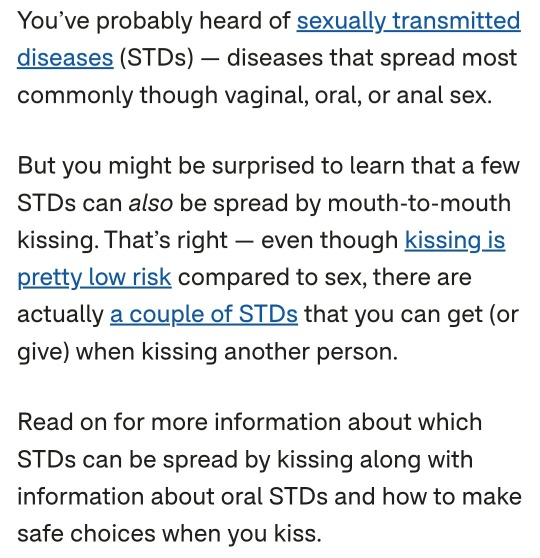
Small microorganisms (germs) can cause STDs. Some of these microorganisms can live in your saliva, or they can cause sores in your mouth. This makes it easier for them to spread between people when they kiss, especially during deep, open-mouthed kissing.
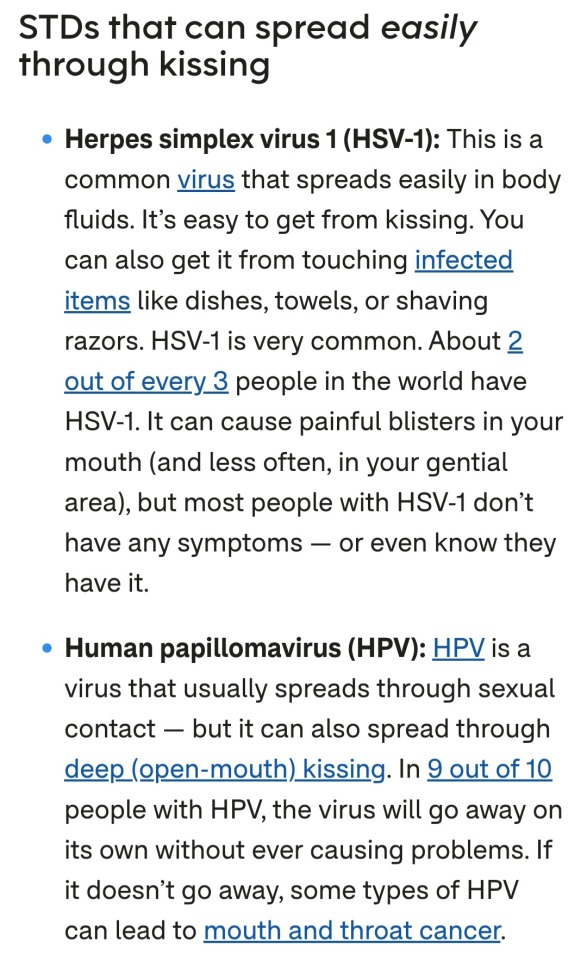
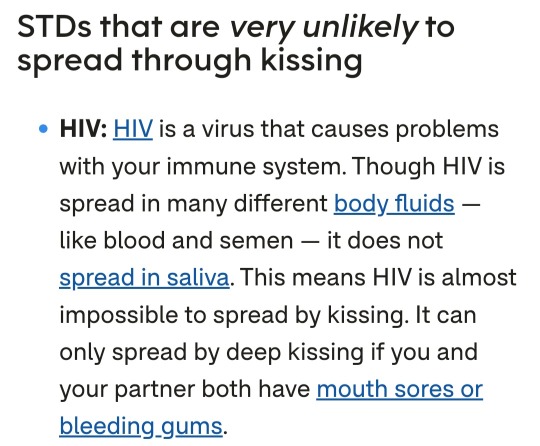


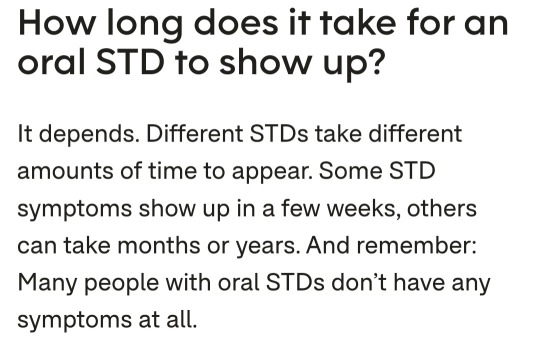
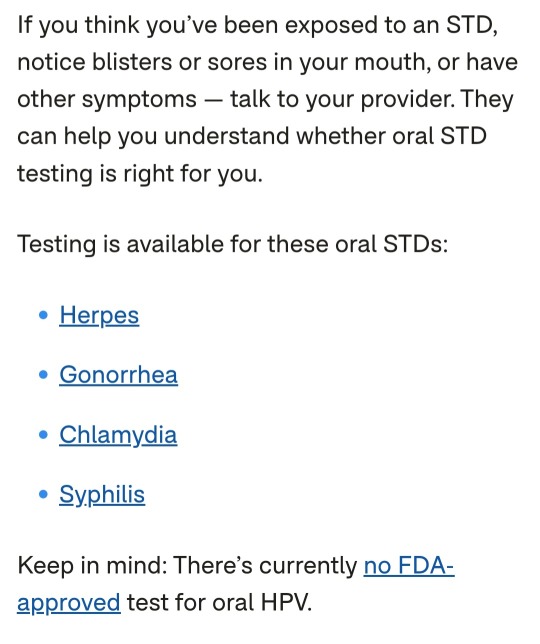

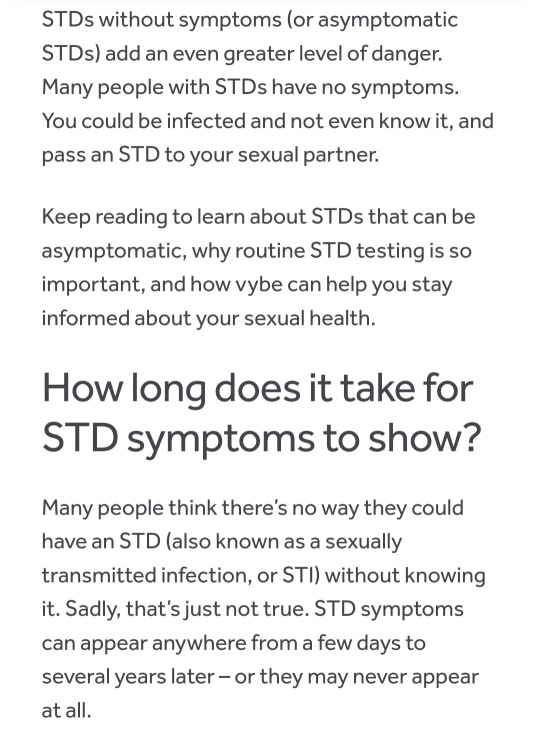
Some STI's cause no symptoms or only mild symptoms. But even with no symptoms, STI's can spread to others. Testing is the only way to be sure you have an STI.
Consider this: about 50% of men and 70% of women infected with Chlamydia, one of the most common STDs, have no symptoms at all. Zero.
The belief that you can tell if someone has an STD by symptoms alone is one of many myths responsible for today's surging STD rates. Yes, there are potential signs of STDs in males and females you should watch for (such as unusual sores, bad-smelling discharge, pain or burning when urinating, or bleeding between periods). However, you should never assume that lacking these symptoms means you're all clear.
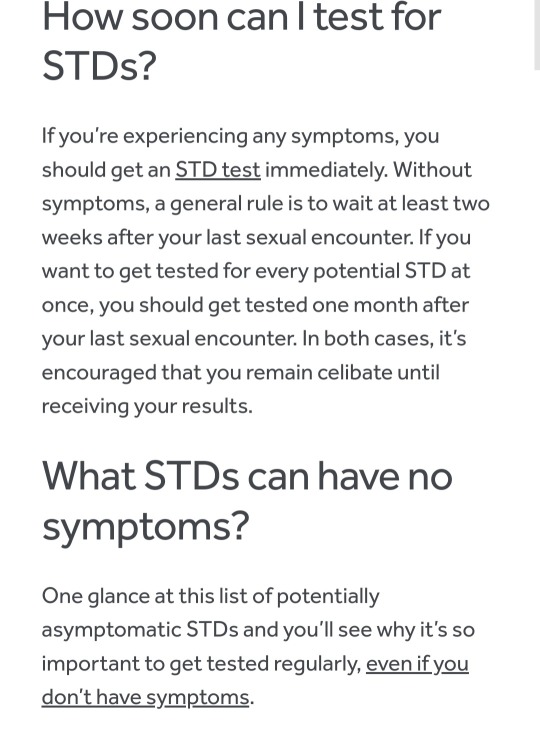
These STD's include Chlamydia, Gonorrhea, HIV, Herpes, Trichomoniasis, HPV, and Hepatitis B.
This is why it's good to get tested with your partner before sexual contact (due to many stds that are asymptomatic).
Also, while most STI's are transmitted through blood, vaginal secretions and semen, there are some that can also be contracted via contact with saliva.
For example, herpes simplex virus (the most common cause of cold sores) can be transmitted via kissing as well as oral. Gonorrhea, and less commonly, Chlamydia, can also be spread via kissing and oral. Importantly, all of these organisms can cause asymptomatic infection, so they can spread before the person is aware they are infected.
0 notes
Text
How to cure Urinary Tract Infection Naturally?
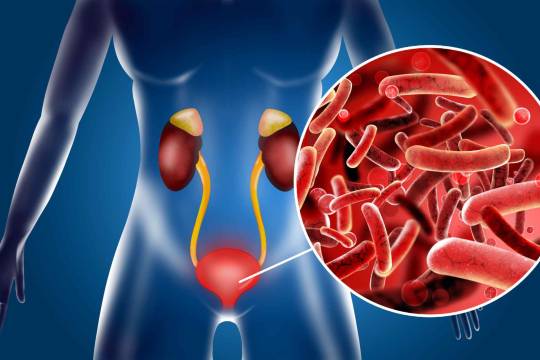
What is Urinary tract Infection?
Urinary system consists of parts such as kidney, ureters, bladder and urethra. Urinary tract infection is the infection of urinary tract. Usually the parts of the system that are infected in urinary tract infection are bladder and urethra but it can involve bladder and kidney. If infection is limited to urethra than it is called as urethritis, if kidneys are involved it is called as pyelonephritis and if bladder is involved it is described as cystitis. Women are more prone to infections than men due to their anatomically smaller length of urethra.
Normally, urine is the byproduct of the kidney which contains excess water along with waste product and toxins removed from the blood. Usually the urine when moving through urinary system does not contain any contamination. It caught infection from outside the body causing infection and inflammation known as urinary tract infection.
Types of UTI:
Vaginitis: It is a vaginal infection
Urethritis: Infection of urethra causing discharge and burning sensation during urination
Cystitis: Bacterial infection spreads to bladder which gives symptoms like pain during urination, reoccurring need to urinate, lower belly pain, cloudy or bloody urine.
Pyelonephritis: When the infection ascends towards kidneys. The severity of the UTI increases as a result of this person have fever with chills, vomiting , nausea, pain abdomen
What causes Urinary tract Infection:
Various microorganisms can lead to UTI usually bacterial. Bacteria such as E.coli, chlamydia, mycoplasma are responsible for urinary tract infection in both male and females. Chlamydia and mycoplasma usually transmits through sexual activity. Men have longer urethra than women that is why women are more at risk.
Women whose mother has frequent history of UTI
Poor genital hygiene
People with diabetes, HIV attracts more infection
Women using spermicides, diaphragm, condoms during intercourse
Women using lubricants to prevent dryness during intercourse
Increased sexual activity
Older people usually get UTI due to catheterisation or prostatitis
Sexually transmitted disease might cause the infection
Weak immune system
Some complications like menopause, spinal injury
Using public toilets
What are the symptoms?
Persistent or instant urge to urinate after shorter period of time
Increased urine frequency
Urine is cloudy, bloody or foul smelly
Fever with chills
burning micturition
vomiting and nausea
lower abdomen, flank or pelvic pain
pressure in lower abdomen or pelvis
Itching in vaginal area
Ayurveda view point over Urinary tract infection:
Ayurveda is a science of holistic healing and it focuses on doshas (Vata, Pitta and Kapha) the three energies of the body. These bodily energies should be in balanced state for a good health. When the doshas are imbalance it leads to diseases. Urinary tract infection is due to the vitiation of all three dosha predominantly pitta dosha. It is mutravaha srotas vyadhi.
Preventions for UTI:
Maintaining good hygiene
Drinking a lot of water
Avoid spicy food
Including probiotics such as curd
Avoid using birth controls like condoms etc
Drinking plenty of fluid like coconut water
Proper urination
Maintaining gut health, avoid eating processed food
Avoiding foods that causes UTI
Drinking tea or coffee
Eating cranberries since it contains proanthocyanidins that prevents the bacteria from sticking to the walls of baldder.
Some potent Herbs For Urinary Tract Infection:
Varuna (Crataeva nurvala): It has anti-inflammatory and antioxidant properties which helps in treating urinary tract infection.it works by flushing out dangerous bacteria out of the body.
Punarnava (Boerhavia diffusa): It is well known Ayurveda herb for urinary infections. It heals urinary infections and has diuretic properties. It’s antimicrobial properties reduces the urinary tract irritation and flushes out the toxins out of the body.
Gokshur (Tribulus terrestris): It is an effective herb for Urinary tract Infection. It significantly relieves the symptoms like burning, itching, discomfort etc. It also have diuretic properties that corrects UTI by maintaining the urine flow.
Some classical Ayurvedic formulation for UTI:
Chandraprabha vati
Varunadi kwath
Punarnavadi kwath
Chandanasava
Guduchi ghan vati
Prval pisti
Tandulodaka (rice water)
Managing Urinary Tract Infection with Chandigarh Ayurved Centre:
Chandigarh Ayurved centre provides you the best natural and herbal remedy “Urinary tract infection (UTI) care kit” which cures the disease in a natural way. It mainly affects the root cause of the disease and helps in curing the disease. The continuous use of this kit shows a proven result.
ALL PRODUCTS DESCRIPTION IN DETAIL:
Liver Care Tablet
The Liver care tablet of CAC is a herbo mineral pure ayurvedic formulation. It mainly works in balancing pitta doshas. liver care tablet consists of ingredients like Kalmegh (Andrographis paniculata), Kutaki(Picrorhiza kurroa), Bhumi amla( Phyllanthus niruri), Giloy(Tinospora Cordifolia), Yavakshar( Hordeum vulgare), Imli Kshar( Tamarindus indica), Mukta Shukta pisti etc. Its main function is to improve the circulation of blood. it works against burning sensation of urine, removes urinary infection and other inflammatory conditions.
Dosage: Take one tablet twice daily with plain water after a meal.
UTI Care Tablet
It’s a 650 mg pure herbo mineral ayurvedic formulation. it treats the root cause of diseases without any side effects. along with the UTI problem it also treats problems related to kidney, urinary bladder, urethra and ureters. it consists of ingredients like Yavakshar (Hordeum vulgare) -200 mg, Kalmi Shora (Potassium nitrate) -150 mg, Nuashadar (Ammonium chloride) -150 mg, Swarna Gairik (Red ochre) -150 mg. It removes the kidney stones, renal colic, painful micturition, hypertension, and burning sensation during the passage of urine. it has antioxidant and anti -inflammatory properties. also useful in dysuria, pelvic pain, urine incontinence, foul odor, etc.
Dosage: take 1 tablet twice daily with plain water after meal.
Trikatu Syrup
Trikatu syrup is pure ayurvedic formulation comprises of mainly three herbs such as Pippali (Piper longum), Shunthi (Zingiber officinale), & Marich (Piper nigrum). the main function of trikatu syrup is it removes excess of Kapha doshas and supports the respiratory system, help to reduce body weight and hence detoxifies the body. it has anti-inflammatory , analgesic and antioxidant properties. It boosts metabolism and works in dysuria, painful micturition, and reduce inflammation of the kidney occurs due to any diseases. It is free from chemicals, additives, colors and fillers.
Dosage: 2 tsp twice daily before a meal.
Detox Premium Powder
It is purely a herbal formulation that helps to reduce inflammation and burning sensation caused due to UTI infection. It has an anti-inflammatory action. It also helps to remove toxins due to its antioxidant properties. It comprises of Moti Pishti, Parwal Pishti, Shukta Pishti, Giloy Satav, Kamdudha Ras, Jahar Mohra, Akik Pishti, Gandhak Rasayan, Shankh Bhasma, Sutshekhar Ras, Sudhyog Tab, Shwet Parpati, Yavakshaar. It has an antibacterial action and provides cooling and calming effect to the body.
Dosage: Take one sachet twice a day with normal plain water.
Sheet dhara:
It is pure herbo mineral ayurvedic formulation which works on doshas of the body especially pitta doshas. It mainly consists of herbs like Ajwaion, Kapur (camphor) and Mint leaves that provide a cooling effect and helps to reduce burning sensation during micturition. it also controls mood swings, bloating and nausea.
Dosage: Take 1/2 or 1 teaspoon of sheet dhara twice daily empty stomach.
0 notes
Text
Cervical cancer - Cancer Rounds
Cervical cancer is a type of cancer that originates in the cervix, which is the lower part of the uterus and is often referred to as the neck of the womb. This form of cancer typically progresses slowly, and its severity depends on factors such as the extent of cervix involvement, the presence of metastasis, and the overall health of the individual.
Cervical Cancer Symptoms: Early stages and precancerous cell changes may not exhibit symptoms. However, being aware of potential signs can aid in early detection, improving survival rates. Symptoms include:
Unusual bleeding (between periods, after sex, post-menopause, or unusually heavy/long periods)
Pain during sexual intercourse
Foul-smelling, watery vaginal discharge containing blood
Pelvic discomfort
General symptoms: extreme tiredness, difficult/painful bowel movements, blood in urine, backache, swollen legs, abdominal pain, weight loss.
If experiencing these symptoms, consulting a doctor promptly is crucial for proper diagnosis. While these symptoms may be caused by various health conditions, it's essential to rule out cervical cancer through medical evaluation.
Causes of Cervical Cancer: Cervical cancer is primarily caused by persistent infection with human papillomavirus (HPV). HPV, a common virus transmitted through skin-to-skin contact in the genital area, can be contracted through sexual activities or by sharing sex toys. Although most HPV types are harmless, certain high-risk variants contribute to cervical cancer development by inducing abnormal cell changes in the cervix.
Additional risk factors include:
Sexual activity: Higher number of sexual partners increases HPV risk.
Smoking: Smoking combined with HPV elevates cervical cancer risk.
Weakened immune system: Conditions like HIV/AIDS or post-transplant increase vulnerability.
Family history: First-degree relatives with cervical cancer elevate risk.
Socio-economic status: Higher rates in deprived areas.
Childbirth: Multiple births or early childbirth may increase risk.
Previous cancers: History of vaginal, vulva, kidney, or bladder cancer elevates risk.
Stages of Cervical Cancer: The stage of cervical cancer determines its size and spread. Stages include:
Stage 1: Cancer cells limited to the cervix.
Stage 2: Spread to the upper vagina or surrounding tissues.
Stage 3: Spread to the lower vagina, pelvic wall, or nearby lymph nodes.
Stage 4: Spread to nearby organs or distant areas like lungs or bones.
Treatment Options: Cervical cancer is treatable, with treatment plans tailored to the cancer type, stage, and individual health. Options include:
Surgery: Removal of part or all of the cervix, vagina, uterus, ovaries, or surrounding organs.
Chemotherapy: Medications to kill cancer cells.
Radiotherapy: High-energy radiation to kill cancer cells.
Targeted drug therapies: Medications to shrink or halt cancer growth.
Risk Reduction Strategies: Several measures can significantly reduce cervical cancer risk:
HPV vaccination: Reduces risk by 87% if administered at age 12-13.
Regular cervical screening: Initiate screenings at age 25.
Smoking cessation: Smoking increases risk; quitting is beneficial.
Condom use: Reduces HPV transmission risk.
Healthy lifestyle: Balanced diet and regular exercise support the immune system.
Importance of Testing: Early detection is crucial for favorable outcomes. Regular screening, HPV vaccination, and at-home testing, such as Cancer Rounds , contribute to early detection and effective prevention.
In conclusion, understanding cervical cancer, its symptoms, causes, diagnosis, and treatment options, along with proactive risk reduction measures, empowers individuals to take charge of their health and reduce the impact of this treatable disease.
#best hospital of cancer in india#cancer top hospital in india#top cancer hospitals india#cancer#health & fitness#business#best oncology hospitals in india#good cancer hospitals in india
0 notes
Text
Reproductive health in women encompasses a wide range of physical, emotional, and social well-being related to the reproductive system
Reproductive health & STIs-
Reproductive health in women encompasses a wide range of physical, emotional, and social well-being related to the reproductive system. It includes not only the absence of diseases or disorders but also the ability to have a satisfying and safe sex life, the capability to reproduce, and the freedom to make choices about one's reproductive health.
Here are some key aspects of reproductive health in women:
1. Menstrual Health:
- Regular menstrual cycles are a sign of a healthy reproductive system. Irregularities in the menstrual cycle may indicate hormonal imbalances or other health issues.
- Menstrual hygiene is crucial to prevent infections. Proper disposal of menstrual products and maintaining cleanliness are essential.
2. Contraception:
- Access to a variety of contraception methods is essential for women to make informed choices about family planning.
- Contraceptive methods include hormonal birth control, barrier methods, intrauterine devices (IUDs), and permanent sterilization options.
3. Sexually Transmitted Infections (STIs):
- Education and awareness about STIs are crucial for preventing their spread. Safe sexual practices, regular testing, and vaccination (e.g., HPV vaccine) are important components of reproductive health.
Sexually Transmitted Infections (STIs), also referred to as sexually transmitted diseases (STDs) or venereal diseases, are infections that are primarily transmitted through sexual activity. They can affect individuals of all ages, genders, and sexual orientations. Here is detailed information on various aspects of STIs:
1. Common STIs:
- Chlamydia: Caused by the bacterium Chlamydia trachomatis, it often presents with no symptoms but can lead to serious reproductive health issues if left untreated.
- Gonorrhea: Caused by the bacterium Neisseria gonorrhoeae, it can affect the genital, rectal, and throat areas and may cause symptoms like discharge, pain, and inflammation.
- Syphilis: Caused by the bacterium Treponema pallidum, it progresses through stages and can affect various organs if untreated.
- Human Papillomavirus (HPV): A group of viruses causing genital warts and linked to cervical and other cancers.
- Herpes Simplex Virus (HSV): Causes painful sores, usually around the genital or oral area.
- HIV (Human Immunodeficiency Virus): Attacks the immune system, leading to acquired immunodeficiency syndrome (AIDS).
2. Transmission:
- STIs are primarily transmitted through unprotected sexual activity, including vaginal, anal, and oral sex.
- Some infections can also be transmitted through non-sexual means, such as sharing needles, blood transfusions (rare), or from mother to child during childbirth or breastfeeding.
3. Prevention:
-Condom Use: Consistent and correct use of condoms during sexual activity can reduce the risk of STI transmission.
- Vaccination: Vaccines are available for certain STIs, such as HPV. Vaccination can prevent some of the most common and high-risk types of the virus.
- Regular Testing: Routine STI screening is important, especially for individuals with multiple sexual partners or those engaging in high-risk behavior.
- Limiting Sexual Partners: Reducing the number of sexual partners can lower the risk of STI transmission.
4. Symptoms:
- Symptoms vary depending on the specific STI but may include genital sores, pain or burning during urination, unusual discharge, itching, and flu-like symptoms.
- Many STIs, especially in the early stages, may be asymptomatic, emphasizing the importance of regular testing.
5. Diagnosis and Treatment:
- Diagnosis often involves a combination of physical exams, laboratory tests (e.g., blood tests, swabs), and patient history.
- Treatment varies based on the specific STI and may involve antibiotics, antiviral medications, or other prescription drugs.
- Early detection and treatment are crucial to prevent complications and further transmission.
6. Complications:
- Untreated STIs can lead to serious complications, including infertility, pelvic inflammatory disease (PID), certain cancers, and increased susceptibility to HIV.
- Some STIs can also be transmitted from a pregnant woman to her child, leading to congenital infections.
7. Global Impact:
- STIs have a significant global impact on public health, contributing to a range of reproductive and other health issues.
- Efforts to control and prevent STIs include public health campaigns, education, and accessible healthcare services.
8. Stigma and Mental Health:
- Stigma associated with STIs can have negative effects on mental health. Open communication, education, and reducing stigma are important for overall well-being.
9. Partner Notification:
- Individuals diagnosed with an STI should inform their sexual partners so that they can also seek testing and treatment.
It's important to note that practicing safe sex, getting regular check-ups, and seeking prompt medical attention if symptoms arise are key components of preventing and managing sexually transmitted infections. Open communication with healthcare providers and sexual partners is crucial for maintaining sexual health and well-being.
4. Preconception Care:
- Preparing for a healthy pregnancy includes lifestyle factors such as maintaining a balanced diet, exercising regularly, and avoiding harmful substances like alcohol and tobacco.
- Identifying and managing pre-existing medical conditions before conception is crucial for a healthy pregnancy.
5. Pregnancy and Childbirth:
- Prenatal care is essential for monitoring the health of both the mother and the developing fetus during pregnancy.
- Safe and supportive childbirth practices contribute to positive reproductive health outcomes.
6. Postpartum Care:
- Physical and emotional well-being after childbirth is vital. Adequate support and care during the postpartum period contribute to a smooth recovery.
Postpartum care refers to the care and support provided to women after childbirth. This period, often referred to as the postpartum or postnatal period, typically spans the first six weeks after giving birth, although it can extend beyond this timeframe. Postpartum care is crucial for the well-being of both the mother and the newborn, addressing physical, emotional, and social aspects of recovery and adjustment. Here are detailed aspects of postpartum care:
1. Physical Recovery:
- Monitoring Vaginal Bleeding: Postpartum bleeding, known as lochia, is normal. However, excessive bleeding or the presence of large clots should be reported to healthcare providers.
- Perineal Care: Proper care of the perineal area, especially if there were tears or an episiotomy during delivery, is essential. Sitz baths, pain management, and keeping the area clean aid in healing.
- Cesarean Section Recovery: For women who underwent a cesarean section, care includes monitoring the incision site, managing pain, and following any specific instructions provided by healthcare professionals.
2. Pelvic Floor Exercises:
- Kegel exercises help strengthen the pelvic floor muscles, promoting bladder and bowel control. These exercises are beneficial for both vaginal and cesarean deliveries.
3. Breastfeeding Support:
- Assistance with breastfeeding techniques and addressing any challenges is crucial during the postpartum period. Lactation consultants and healthcare providers can offer guidance.
- Addressing issues such as nipple pain, engorgement, and establishing a feeding routine.
4. Emotional Well-Being:
Postpartum Depression (PPD) Screening: Regular assessments for postpartum depression and other mood disorders are essential. Early detection allows for prompt intervention and support.
Emotional Support: Emotional well-being is crucial. Mothers may experience a range of emotions, and having a support system in place is vital. This includes partners, family, friends, and healthcare professionals.
5. Nutrition and Hydration:
- A balanced diet with a focus on nourishing foods is important for postpartum recovery, especially if the mother is breastfeeding.
- Adequate hydration is essential, especially if breastfeeding.
6. Rest and Sleep:
- Ensuring that the mother gets sufficient rest is important for recovery. Support from family and friends in managing household tasks allows the mother to focus on self-care and bonding with the newborn.
7. Postpartum Checkups:
- Regular follow-up appointments with healthcare providers are scheduled to monitor the mother's physical and emotional well-being. Any concerns or complications can be addressed during these visits.
8. Contraception and Family Planning:
- Discussions about contraception options and family planning are often initiated during postpartum care appointments.
9. Resumption of Physical Activity:
- Gradual resumption of physical activity, including exercise, is usually recommended after the postpartum period. However, individual recommendations may vary based on the mother's health and the type of delivery.
10. Birth Control and Family Planning:
- Discussing and choosing an appropriate method of birth control is often part of postpartum care. This is important for women who wish to space their pregnancies or prevent future pregnancies.
Postpartum care is a comprehensive and individualized process, and the specific details may vary based on factors such as the mother's health, the type of delivery, and any complications that may have arisen during childbirth. Continuous communication with healthcare providers and access to a supportive network are essential components of effective postpartum care.
7. Infertility:
- Infertility issues can be complex and may involve both male and female factors. Access to fertility treatments, counseling, and support are important aspects of reproductive health.
8. Gynecological Health:
- Regular gynecological check-ups, including pelvic exams and Pap smears, help in early detection and prevention of reproductive health issues, including cervical cancer.
9. Menopause:
- Understanding and managing the physical and emotional changes associated with menopause is crucial for maintaining overall well-being.
10. Counseling and Education:
- Access to information, education, and counseling services on reproductive health empowers women to make informed decisions about their bodies, sexuality, and overall well-being.
Promoting reproductive health involves addressing social, economic, and cultural factors that impact women's ability to make choices about their reproductive lives. It requires a holistic approach that integrates medical care, education, and support services. Additionally, ensuring access to healthcare services and promoting gender equality are fundamental aspects of advancing reproductive health for women.
World Sexual Health Day(4th september)-
September 4th is recognized as World Sexual Health Day. This day is dedicated to promoting sexual health around the world. While it has a broader focus on sexual health in general, it often includes discussions, events, and initiatives related to preventing and addressing sexually transmitted infections (STIs).
World Sexual Health Day aims to raise awareness about sexual health issues, break down stigma and discrimination, and promote access to accurate information and healthcare services related to sexual well-being.
It's worth checking with relevant health organizations or international health agencies for any updates or specific activities related to World Sexual Health Day or STI awareness on September 4th, as public health initiatives and awareness days may evolve over time.
1 note
·
View note
Text
Comprehensive understanding Cytomegalovirus (CMV)
Cytomegalovirus (CMV) is a common virus belonging to the herpesvirus family. It can infect people of all ages and is typically asymptomatic in healthy individuals. However, it can cause serious complications in people with weakened immune systems, such as those with HIV/AIDS, organ transplant recipients, and infants infected during pregnancy.
Key Points about Cytomegalovirus (CMV):
Transmission:
CMV is primarily transmitted through close contact with bodily fluids, such as saliva, urine, blood, and breast milk.
It can be spread through direct contact with infected individuals, as well as through organ transplantation, blood transfusions, and sexual activity.
Symptoms:
Many healthy individuals infected with CMV may not experience noticeable symptoms.
Symptoms, when present, can include fever, fatigue, muscle aches, and swollen glands.
CMV can cause mononucleosis-like symptoms, especially in young adults.
Complications:
In healthy individuals, CMV infection is usually mild and self-limiting.
Individuals with weakened immune systems, such as those with HIV/AIDS or organ transplant recipients, may experience more severe and potentially life-threatening complications.
Congenital CMV infection in infants can lead to developmental and neurological problems.
Congenital CMV:
CMV can be transmitted from a pregnant woman to her fetus, leading to congenital CMV infection.
Infants with congenital CMV may be asymptomatic at birth but can develop complications later, such as hearing loss and developmental delays.
Diagnosis:
Laboratory tests, including blood tests and polymerase chain reaction (PCR) tests, can be used to diagnose CMV infection.
Treatment:
In healthy individuals, CMV infection often does not require specific antiviral treatment.
Antiviral medications, such as ganciclovir or valganciclovir, may be prescribed for severe cases or in individuals with compromised immune systems.
Prevention:
Good hygiene practices, including regular handwashing, can help reduce the risk of CMV transmission.
Pregnant women are advised to practice safe sex and avoid close contact with young children who may carry the virus.
0 notes
Text
STD Test Dubai - Why It's Important to Get Tested
A STD test or Sexually Transmitted Infection is a medical examination that checks for infections or diseases transferred through sexual contact. The most common infections include HIV, herpes, chlamydia, genital warts, hepatitis A, B and C as well as gonorrhoea. The tests can be done using blood or a sample of a vaginal, anal or oral discharge. You can find more information about choosing a STD Test Dubai.
If an infection is diagnosed, a medical professional can prescribe medicine that will treat the disease and prevent further outbreaks. Some STIs can cause long term health problems like infertility, so it's important to get tested regularly. Using condoms during sex can also help reduce the risk of getting an STI.
Some STIs such as herpes, genital warts and hepatitis A, B and CD can remain in the body for a long time without producing any symptoms. That's why it's important to seek treatment early, as many STIs can be easily treated with antibiotics. If left untreated STIs can lead to serious complications such as pelvic inflammatory disease (PID), ectopic pregnancy, infertility and genital cancer.
In some cases, a woman who is infected with certain STIs can pass the disease to her fetus during childbirth or through the placenta. This can cause life threatening conditions such as herpes, syphilis and gonorrhoea in the baby or severe infertility.
A person can catch STIs through vaginal, anal or oral sex, or from genital contact with someone who has the disease. Some STIs, such as herpes, hepatitis A, hepatitis B and hepatitis C can be spread from mother to baby during pregnancy or delivery.
STI testing is available at most healthcare clinics and hospitals in Dubai. However, not all STI tests are the same, and it's important to choose a provider that offers accurate and confidential testing. Better2Know's testing services are available across the UAE and provide a fast, accurate and discreet service. A qualified nurse will visit your home or hotel to collect a sample of your urine, blood or vaginal secretions and send it to one of our accredited laboratories for analysis.
Our highly experienced nurses are fully trained and follow strict procedures to ensure that all samples are tested correctly and your results are received within the required timeframe. In some cases, you may be asked to return to your local Better2Know centre for a face-to-face appointment with a Doctor who will explain the results and discuss any treatment options.
The team at Better2Know are here to support you through every step of your journey. We understand that undergoing STI testing can be a difficult and emotional experience. We promise to offer you a friendly, compassionate and discreet service at all times, with complete confidentiality. Our specialist doctors are on hand to answer any questions you may have, and we will always respect your privacy.
1 note
·
View note
Text
Know Sexually Transmitted Infections (STDs) Signs and Symptoms
Sexually Transmitted Infections (STDs), also known as Sexually Transmitted Diseases (STIs), are a group of infections that are primarily spread through sexual contact. They affect millions of people worldwide and can have serious health consequences if left untreated. Understanding the signs and symptoms of STDs is crucial for early detection and treatment. In this blog, we will discuss some of the most common STDs and their associated signs and symptoms.
Chlamydia
Chlamydia is one of the most common STDs and often shows no symptoms. When symptoms do occur, they may include:
Painful urination
Abnormal genital discharge
Pain or swelling in the testicles for men
Pain during sexual intercourse for women
Lower abdominal pain

Gonorrhea
Gonorrhea shares some symptoms with chlamydia, such as painful urination and abnormal discharge. However, additional signs may include:
Sore throat
Painful bowel movements
Pelvic inflammatory disease in women, which can lead to infertility if left untreated
Syphilis
Syphilis is a bacterial infection that progresses in stages, with symptoms varying at each stage. The primary stage is characterized by a painless sore or ulcer at the site of infection, usually the genitals or mouth. As the infection progresses, symptoms can include:
Skin rashes
Fever
Swollen lymph nodes
Fatigue
Joint pain
Organ damage in the tertiary stage, which can be life-threatening
Herpes
Herpes is caused by the herpes simplex virus and can result in recurring outbreaks of painful sores or blisters in the genital or oral area. Other symptoms may include:
Itching and burning before the sores appear
Flu-like symptoms during the initial outbreak
Nerve pain

Human Papillomavirus (HPV)
HPV is one of the most common STDs, with many strains that can cause genital warts or lead to certain types of cancer, such as cervical cancer. Genital warts are the most common symptom, but some HPV strains do not produce visible symptoms. Regular screenings and HPV vaccinations are crucial in preventing associated health risks.
Human Immunodeficiency Virus (HIV)
HIV attacks the immune system and can lead to acquired immunodeficiency syndrome (AIDS) if left untreated. Early HIV infection may cause flu-like symptoms, but it often progresses without noticeable symptoms for years. Later-stage symptoms can include:
Rapid weight loss
Chronic diarrhea
Pneumonia
Skin rashes
Night sweats
Swollen lymph nodes
Opportunistic infections
Trichomoniasis
Trichomoniasis is caused by a parasite and can result in symptoms such as:
Vaginal itching
Abnormal discharge with a foul odor
Painful urination
Itching and redness in the genital area
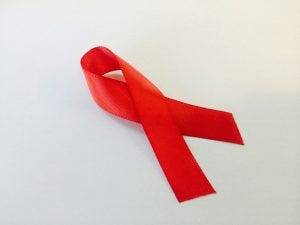
Conclusion
Sexually Transmitted Infections can affect anyone who engages in sexual activity, and some may not exhibit any symptoms. Regular screenings, practicing safe sex, and open communication with sexual partners are essential steps in preventing and managing STDs. Early detection and treatment are crucial for reducing the risk of complications and the spread of infections. If you suspect you have an STD or are at risk, consult a healthcare professional for testing and guidance on the best prevention methods. Remember that safe sex and open conversations about sexual health are key to reducing the prevalence of STDs in our communities.
0 notes
Text
I Pill- No Magic Pill – What Every Woman Should Know
Picture this — patient XYZ reports to the OPD with irregular spotting through out the month . On taking a detailed history ,you find out she’s taken an I pill three times in the course of 35 days ,every time she has unprotected sex . She’s also complaining of nausea and occasional vomiting . We do a urine pregnancy test and to her surprise and horror she tests positive for pregnancy . But how? That’s her constant refrain .
Let me tell you about the I pill or the emergency contraceptive pill .
What exactly is the Emergency contraceptive pill?
As the name suggests , the Emergency contraceptive pill is a hormone containing pill that contains a high dose of the hormone Levonorgestrel ( a progesterone ) . It is to be used only in an emergency , ( within 72 hours of sex) for instance when a condom has slipped , burst , leaked or if you’ve forgotten to take your regular oral contraceptive pill . It can be used if there has been an occasional unprotected , unplanned intercourse or if there’s forced sex . It is never to be used as a regular method of contraception . The success rates are about 90 % and failure rates around 10 % . Success rates are better if taken within 24 hours of intercourse . In comparison , the failure rates of regular low dose oral contraceptive pills are less than 1 % only .
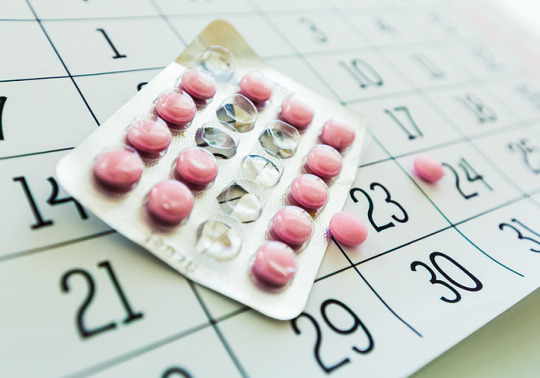
IT IS THEREFORE A BACKUP METHOD OF CONTRACEPTION NOT A REGULAR PRIMARY ONE
Is there misuse of this contraceptive pill ? What are the problems that could arise due to indiscriminate use of this I pill?
The answer to the first part of the question sadly , is yes. This pill is available over the counter and with huge publicity around it , most women are using it without thinking twice . If this is popped so frequently there are chances that there will be irresponsible and unsafe sex leading to sexually transmitted diseases and unwanted pregnancies . This pill also comes with its side effects and is definitely no magic pill .
What are the side effects of the Emergency contraceptive pill ?

Hence please give up using this commercially easily available pill as the magic cure or prevention of an unwanted pregnancy ; switch to regular methods of contraception some of which even protect you against STDs like gonorrhoea , chlamydia, herpes , HIV , hepatitis B etc .
Take charge of your reproductive health today
1 note
·
View note
Text
Ayurveda's Mission to Combat HIVAIDS And Herpes

In 2006, Bhagwati Ayurved Pvt. Ltd. was founded to provide care and treatment to humanity for their condition so that a healthy society could be developed. The company's goal was to offer a platform for raising knowledge about Ayurveda and to assist the world in recognizing its value. Contact us at... to learn more about micro-immunotherapy as a Treatment of Herpes Simplex Virus infection. Because of its long research and development history, the company is now highly sought after domestically and internationally for its Ayurvedic treatment of HIV and Herpes.
Ayurveda's Mission: To Combat HIV/AIDS And Herpes Bhagwati Ayurved Pvt. Ltd. has spent years developing BHAGWATI CONSTOP, a reliable treatment for HIV and Herpes, and it has been widely successful. It is not advertising itself as a miracle medication, but it is a powerful illustration of the potential of Ayurveda to treat severe conditions.
Bhagwati Ayurved Pvt. Ltd., being a reputable business, seeks to discover and offer its customers effective natural and healthy medicines. In addition to the preceding, our sincerest wish is to distinguish ourselves in the cutthroat international market by constantly adhering to the highest standards of professionalism and best practices.
HIV and HERPES: A Brief Overview
HIV:
The human body's immune system is a target of the human immunodeficiency virus. Two species of Lentivirus (a subtype of retrovirus) infect people and are known as Human Immunodeficiency Viruses (HIV). Acquired immunodeficiency syndrome (AIDS) is a disorder in which the immune system gradually fails, developing potentially fatal opportunistic infections and malignancies.
HIV is often spread through sexual contact or the sharing of bodily fluids such as blood, pre-ejaculate, sperm, and genital secretions. Helper T cells (especially CD4+ T cells), macrophages, and dendritic cells are all infected by HIV. Multiple mechanisms contribute to the depletion of CD4+ T cells in an HIV infection, such as pyro ptosis of abortively infected T cells, apoptosis of uninfected bystander cells, the direct viral killing of infected cells, and killing of infected CD4+ T cells by CD8+ cytotoxic lymphocytes that recognize infected cells. Cell-mediated immunity is lost when CD4+ T cell levels drop below a key threshold, making the body increasingly vulnerable to opportunistic infections and, eventually, AIDS.
Herpes:
Infection with the herpes simplex virus may be traced back to the herpes simplex virus. It manifests in various ways, including developing blisters or sores in and around the mouth or genitalia. Blisters appear on or around the lips and mouth due to oral herpes, also known as fever or cold sores. Sores caused by genital herpes most commonly appear on the penis, buttocks, anus, and vagina. However, they can appear elsewhere on the body. Herpes can also alter vaginal discharge and produce discomfort during urination. The herpes simplex virus is contagious and can be transmitted through physical contact. After the first infection, the virus spreads to the nerve cells beneath the skin, which multiplies and causes serious illness.
The Cure: An Ayurvedic Approach
Many participants in our clinical trials have reported improved health since using Bhagwati Cons top. HIV infection can be treated with this medication. The findings of the standard RNA-PCR test have been used to confirm the treatment's efficacy in all of our patients. To keep up with the latest results, patients have undergone “Herpes Simplex Virus Antibodies Tests" at Bhagwati Cons top to monitor the virus's progress against the clinic. In addition, the company's focus on R&D for novel medications that might be useful in treating other diseases remains unabated. There have been several points and events where the organization's work has been acknowledged. Several industry awards have been bestowed upon the company. The best price for Medicine for Herpes Simplex Virus can be found at Bhagwati Ayurved.
#Herbal Remedies for Genital Herpes#Genital Warts Ayurvedic Treatment#Herpes Treatment#Medicine for HSV
0 notes
Text
Get the Care You Deserve at Hillsboro Urgent Care
At Hillsboro Urgent Care, we understand that when you need medical care, you need it fast and with the highest quality of care. That’s why we offer a wide range of services to meet your needs, from urgent care and lab testing to medical weight loss and STD testing. Our team of experienced physicians and staff members is dedicated to providing exceptional care to ensure your health and well-being.

Urgent Care in Deerfield Beach, FL
When you need immediate medical attention, turn to Hillsboro Urgent Care. Our center provides quality care for illnesses and injuries that require urgent attention but are not life-threatening. Whether you’re suffering from a cold, the flu, or a minor injury, our experienced physicians and staff will provide the care you need in a timely and efficient manner.
Lab Testing in Deerfield Beach, FL
At Hillsboro Urgent Care, we offer a wide range of lab tests to diagnose and treat illnesses and injuries. From blood tests to urine tests, we can help you get the answers you need quickly and accurately. Our lab tests can detect a variety of conditions, including infections, diabetes, and heart disease.
Medical Weight Loss in Deerfield Beach, FL
If you’re looking to lose weight and improve your health, our medical weight loss program is the perfect solution. Obesity is a complex health issue that can lead to a variety of serious, and often life-threatening, diseases. It contributes to high blood pressure, certain types of cancer, sleep apnea, and fatty liver disease. To prevent these issues, our experienced team members will work with you to create a personalized plan that meets your individual needs and goals. We offer a range of services, including diet and nutrition counseling, fitness classes, and more.
STD Testing in Deerfield Beach, FL
If you’re concerned about sexually transmitted diseases, we can help. Our STD testing services allow you to get tested quickly and privately. Testing is a crucial component of maintaining sexual and overall health. Regular testing is essential because many STDs can exist without any apparent symptoms, meaning individuals can unknowingly harbor and transmit these infections to others. Early detection through STD testing can prevent serious health complications, such as infertility, certain types of cancer, organ damage, and in some cases, even death. Testing also plays a vital role in curbing the spread of these diseases within the community. As a result, we offer a range of tests to detect a variety of STDs, including HIV, chlamydia, gonorrhea, and syphilis.
Experience the Care You Deserve at Hillsboro Urgent Care
At Hillsboro Urgent Care, we are committed to providing the highest quality of care for our patients. Our experienced team of physicians and staff members is dedicated to providing the best possible medical services for your health and well-being. Whether you need urgent care, lab testing, medical weight loss, or STD testing, you can count on us to provide the care you deserve.
If you’re looking for quality medical care in Deerfield Beach, FL, look no further than Hillsboro Urgent Care. There is no need for an appointment, but we encourage prospective patients to contact Hillsboro Urgent Care to learn more about our services and the treatment plans we can design to treat your medical problem.
0 notes
Text
What to Expect in Gynecological Checkup?
Going to the best gynecologist in Kuwait can be a bit nerve-wracking for many women, but it's totally normal.
It's like this symbolic transition from girlhood to womanhood, right? Don't worry. It's a journey all women go through.
The cool thing is a gynecologist can help you get more in tune with your body. Regular checkups allow you to take charge of your physical and reproductive well-being.
You feel comfortable having someone by your side to guide you through everything from birth control and childbirth to dealing with menopause.
Oh, and that's not all! Your gynecologist also screens for cancer, handles infections, and even performs surgeries for any pelvic organ or urinary tract issues.
Now we totally get that you might be anxious about these annual appointments, but fear not! As a top gynecology center in Kuwait, we will provide some tips to help you prepare and take the fear out of the equation.
It's all about being informed and knowing what to expect.
So, let's dive in!
What are Gynecological Examinations?
The gynecological exam usually comprises an examination of the exterior and internal genitalia. A rectal examination may also be required in some cases.
Gynecological examinations are frequently performed on individuals who have gynecological problems. The exam may aid in the early diagnosis of malignancies and improve results.
This exercise covers the indications, contraindications, and procedures involved in completing a gynecological exam and emphasizes the role of the interprofessional team in caring for patients having this test.
Aim:
Determine the reasons for a pelvic exam.
Describe the procedure for doing a pelvic exam.
Describe the clinical importance of a pelvic exam.
Summarize the significance of interprofessional teamwork and communication in improving outcomes for women with pelvic lesions.
What is the Recommended Age to Begin Scheduling Gynecological Checkups?
Your first session will most likely take place between the ages of 13 and 15.
Some women postpone gynecological exams until they have had their first sex or until they experience a symptom or condition such as abnormal vaginal discharge, vaginal burning, severe menstrual cramps, or irregular periods.
Here are Some Things to Look Forward to Your First Checkup
1. Examination of General Health
Your nurse weighs you and takes your blood pressure. Blood and urine tests may also be conducted.
2. Physical Examination
During a physical exam, a nurse will ask you general questions about your personal and family health history.
Then, you will be taken to an exam room and asked to undress. A gown that opens at the front will be provided, and a sheet will cover your lap for privacy.
3. Pelvic Examination
During a gynecological exam, your doctor will ask you to lie on an exam table and place your feet in stirrups. Your legs will be open for the doctor to examine your vagina.
The doctor will wear gloves and check the vulva or outside of the vagina for signs of infection.
Using a speculum, a device that holds the vagina open, the doctor will then examine the inside of the vagina to check for cysts or assess its size.
4. Pap Smear
During a pelvic exam, it is standard procedure for your doctor to perform a Pap test.
This involves using a specialized brush to remove cell samples from your cervix, which are then sent to a lab to be thoroughly examined for any abnormalities, including cervical cancer.
The term "Pap" is derived from scraping off a few cells from the surface of the cervix using this specialized brush, which is then meticulously analyzed in the lab for the presence of any abnormal cells.
5. STD Tests
If you are sexually active, it is vital to get tested for sexually transmitted diseases (STDs) like gonorrhea, chlamydia, syphilis, and HIV.
Your doctor will take a tissue swab during your pelvic exam or order blood tests to check for STDs.
It's essential to stay informed about your sexual health to prevent the spread of STDs.
6. Breast Examination
As part of your appointment with the doctor, it is imperative that they thoroughly examine your breasts for any potential lumps, unusual discharge, or other irregularities.
This is an essential step in maintaining your overall health and well-being.
To Sum Up
It is vital for women to undergo gynecological checkups to maintain their overall health and well-being.
Regular screenings can help detect and prevent potential issues, promoting better reproductive health.
At Quttainah Medical Center, we prioritize women's health by offering comprehensive and compassionate gynecological services.
Our experienced and skilled professionals ensure a confidential environment during each checkup.
So why wait?
Schedule a consultation with the best gynecology center in Kuwait, where your well-being is our top priority.
We care about your health!
0 notes
Text
Urinary Tract Infection
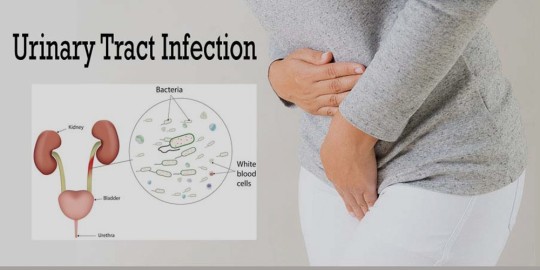
What is Urinary tract Infection?
Urinary system consists of parts such as kidney, ureters, bladder and urethra. Urinary tract infection is the infection of urinary tract. Usually the parts of the system that are infected in urinary tract infection are bladder and urethra but it can involve bladder and kidney. If infection is limited to urethra than it is called as urethritis, if kidneys are involved it is called as pyelonephritis and if bladder is involved it is described as cystitis. Women are more prone to infections than men due to their anatomically smaller length of urethra.
Normally, urine is the byproduct of the kidney which contains excess water along with waste product and toxins removed from the blood. Usually the urine when moving through urinary system does not contain any contamination. It caught infection from outside the body causing infection and inflammation known as urinary tract infection.
Types of UTI:
Vaginitis: It is a vaginal infection
Urethritis: Infection of urethra causing discharge and burning sensation during urination
Cystitis: Bacterial infection spreads to bladder which gives symptoms like pain during urination, reoccurring need to urinate, lower belly pain, cloudy or bloody urine.
Pyelonephritis: When the infection ascends towards kidneys. The severity of the UTI increases as a result of this person have fever with chills, vomiting , nausea, pain abdomen
What causes Urinary tract Infection:
Various microorganisms can lead to UTI usually bacterial. Bacteria such as E.coli, chlamydia, mycoplasma are responsible for urinary tract infection in both male and females. Chlamydia and mycoplasma usually transmits through sexual activity. Men have longer urethra than women that is why women are more at risk.
Women whose mother has frequent history of UTI
Poor genital hygiene
People with diabetes, HIV attracts more infection
Women using spermicides, diaphragm, condoms during intercourse
Women using lubricants to prevent dryness during intercourse
Increased sexual activity
Older people usually get UTI due to catheterisation or prostatitis
Sexually transmitted disease might cause the infection
Weak immune system
Some complications like menopause, spinal injury
Using public toilets
What are the symptoms?
Persistent or instant urge to urinate after shorter period of time
Increased urine frequency
Urine is cloudy, bloody or foul smelly
Fever with chills
burning micturition
vomiting and nausea
lower abdomen, flank or pelvic pain
pressure in lower abdomen or pelvis
Itching in vaginal area
Ayurveda view point over Urinary tract infection:
Ayurveda is a science of holistic healing and it focuses on doshas (Vata, Pitta and Kapha) the three energies of the body. These bodily energies should be in balanced state for a good health. When the doshas are imbalance it leads to diseases. Urinary tract infection is due to the vitiation of all three dosha predominantly pitta dosha. It is mutravaha srotas vyadhi.
Preventions for UTI:
Maintaining good hygiene
Drinking a lot of water
Avoid spicy food
Including probiotics such as curd
Avoid using birth controls like condoms etc
Drinking plenty of fluid like coconut water
Proper urination
Maintaining gut health, avoid eating processed food
Avoiding foods that causes UTI
Drinking tea or coffee
Eating cranberries since it contains proanthocyanidins that prevents the bacteria from sticking to the walls of baldder.
Some potent Herbs For Urinary Tract Infection:
Varuna (Crataeva nurvala): It has anti-inflammatory and antioxidant properties which helps in treating urinary tract infection.it works by flushing out dangerous bacteria out of the body.
Punarnava (Boerhavia diffusa): It is well known Ayurveda herb for urinary infections. It heals urinary infections and has diuretic properties. It’s antimicrobial properties reduces the urinary tract irritation and flushes out the toxins out of the body.
Gokshur (Tribulus terrestris): It is an effective herb for Urinary tract Infection. It significantly relieves the symptoms like burning, itching, discomfort etc. It also have diuretic properties that corrects UTI by maintaining the urine flow.
Some classical Ayurvedic formulation for UTI:
Chandraprabha vati
Varunadi kwath
Punarnavadi kwath
Chandanasava
Guduchi ghan vati
Prval pisti
Tandulodaka (rice water)
Managing Urinary Tract Infection with Chandigarh Ayurved Centre:
Chandigarh Ayurved centre provides you the best natural and herbal remedy “Urinary tract infection (UTI) care kit” which cures the disease in a natural way. It mainly affects the root cause of the disease and helps in curing the disease. The continuous use of this kit shows a proven result.
ALL PRODUCTS DESCRIPTION IN DETAIL:
Liver Care Tablet
The Liver care tablet of CAC is a herbo mineral pure ayurvedic formulation. It mainly works in balancing pitta doshas. liver care tablet consists of ingredients like Kalmegh (Andrographis paniculata), Kutaki(Picrorhiza kurroa), Bhumi amla( Phyllanthus niruri), Giloy(Tinospora Cordifolia), Yavakshar( Hordeum vulgare), Imli Kshar( Tamarindus indica), Mukta Shukta pisti etc. Its main function is to improve the circulation of blood. it works against burning sensation of urine, removes urinary infection and other inflammatory conditions.
Dosage: Take one tablet twice daily with plain water after a meal.
UTI Care Tablet
It’s a 650 mg pure herbo mineral ayurvedic formulation. it treats the root cause of diseases without any side effects. along with the UTI problem it also treats problems related to kidney, urinary bladder, urethra and ureters. it consists of ingredients like Yavakshar (Hordeum vulgare) -200 mg, Kalmi Shora (Potassium nitrate) -150 mg, Nuashadar (Ammonium chloride) -150 mg, Swarna Gairik (Red ochre) -150 mg. It removes the kidney stones, renal colic, painful micturition, hypertension, and burning sensation during the passage of urine. it has antioxidant and anti -inflammatory properties. also useful in dysuria, pelvic pain, urine incontinence, foul odor, etc.
Dosage: take 1 tablet twice daily with plain water after meal.
Trikatu Syrup
Trikatu syrup is pure ayurvedic formulation comprises of mainly three herbs such as Pippali (Piper longum), Shunthi (Zingiber officinale), & Marich (Piper nigrum). the main function of trikatu syrup is it removes excess of Kapha doshas and supports the respiratory system, help to reduce body weight and hence detoxifies the body. it has anti-inflammatory , analgesic and antioxidant properties. It boosts metabolism and works in dysuria, painful micturition, and reduce inflammation of the kidney occurs due to any diseases. It is free from chemicals, additives, colors and fillers.
Dosage: 2 tsp twice daily before a meal.
Detox Premium Powder
It is purely a herbal formulation that helps to reduce inflammation and burning sensation caused due to UTI infection. It has an anti-inflammatory action. It also helps to remove toxins due to its antioxidant properties. It comprises of Moti Pishti, Parwal Pishti, Shukta Pishti, Giloy Satav, Kamdudha Ras, Jahar Mohra, Akik Pishti, Gandhak Rasayan, Shankh Bhasma, Sutshekhar Ras, Sudhyog Tab, Shwet Parpati, Yavakshaar. It has an antibacterial action and provides cooling and calming effect to the body.
Dosage: Take one sachet twice a day with normal plain water.
Sheet dhara:
It is pure herbo mineral ayurvedic formulation which works on doshas of the body especially pitta doshas. It mainly consists of herbs like Ajwaion, Kapur (camphor) and Mint leaves that provide a cooling effect and helps to reduce burning sensation during micturition. it also controls mood swings, bloating and nausea.
Dosage: Take 1/2 or 1 teaspoon of sheet dhara twice daily empty stomach.
0 notes